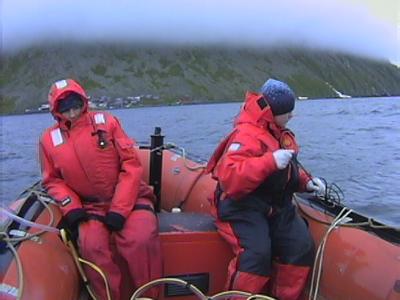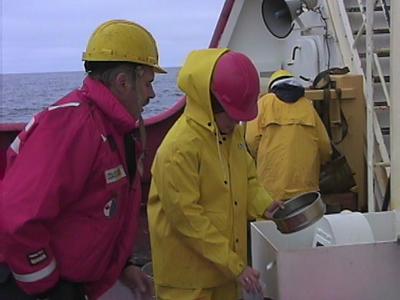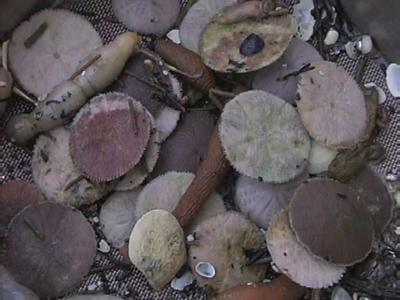18 July, 2003
Water Sampling At
Diomede
While on Little Diomede Island this past March/April we periodically
sampled seawater at a number of locations where we had augured holes through
the ice earlier. At each location we took a GPS reading and lowered
instruments into the water to measure salinity, temperature and dissolved
oxygen. Readings were taken near the bottom of the sea and about one meter
below the bottom of the ice. We also collected water samples at each site.
On this trip we returned to the GPS locations to repeat the process,
although this time by boat. At about 7:30 in the morning Lee, Ari, Rebecca
and I (each wearing the fashionable bright orange Mustang survival suit)
scrambled down the rope ladder onto a small boat.
We immediately headed to our northern most sites skipping through the
choppy water and the cold, cold, cold, cold wind. However, in my survival
suit I was sweltering. We stayed near the Diomede shoreline observing the
bird life masses. After being buzzed by murres, puffins and other species we
reached the site and collected our samples and data.
The next sites were located just offshore from the science shack and
the proposed permanent water intake line. After three more sites I boarded a
zodiac and headed back to the Laurier. What I thought was just a mild case
of seasickness have progressively gotten worse. I fumbled through three
stations over night after we left Diomede and headed north and at about
10:00 on the morning of the 18th my body had enough. I spent the next
twenty-six hours in bed with stomach flu.
Having the a stomach flu on a rocking ship was bad enough but even
worse was the fact that I did not get to go ashore again on Diomede and I
slept through the Arctic Crossing Ceremony aboard ship. But even far worse
than those two things was that I missed 6 meals, something you do not want
to do aboard this ship. (Yes they are that good)

Rebecca (L) and Ari (R)bundled up against the cold while collecting data off Little Diomede.

Back aboard the Laurier the Captians checks out the mud screening finds.

Lots of sand dollars begin to appear at these stations.
Contact the TEA in the field at
.
If you cannot connect through your browser, copy the
TEA's e-mail address in the "To:" line of
your favorite e-mail package.
|
